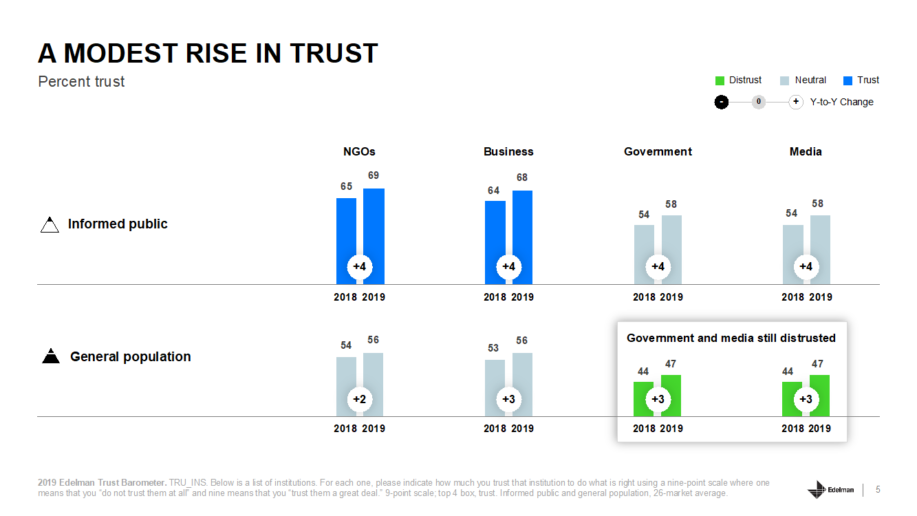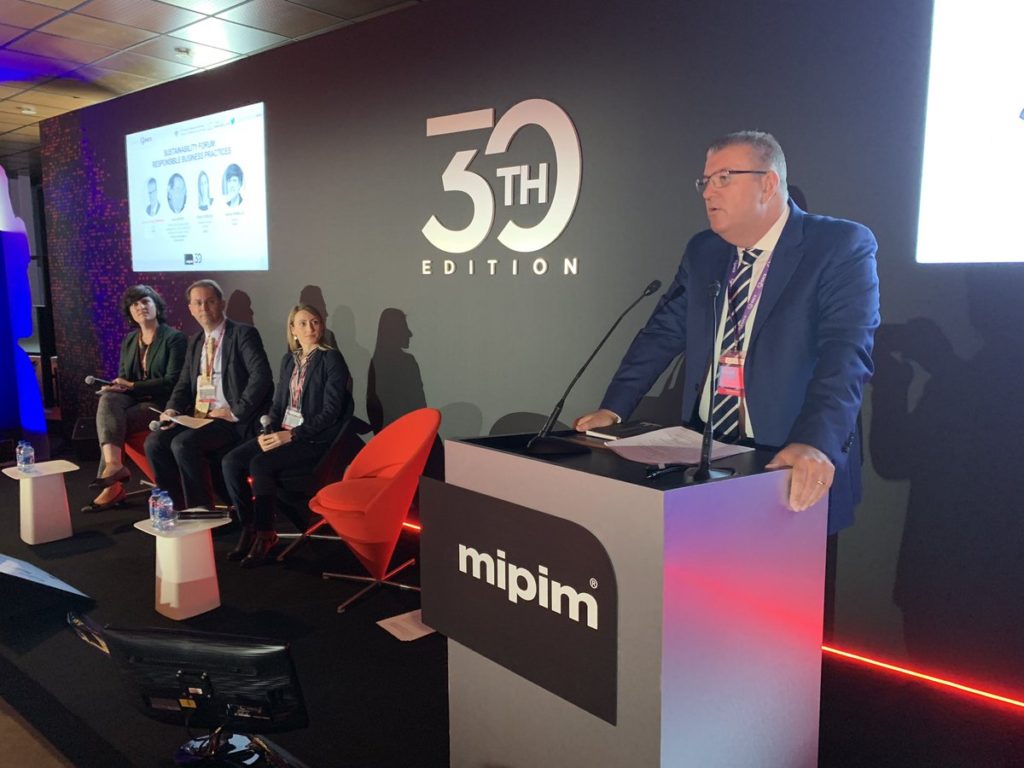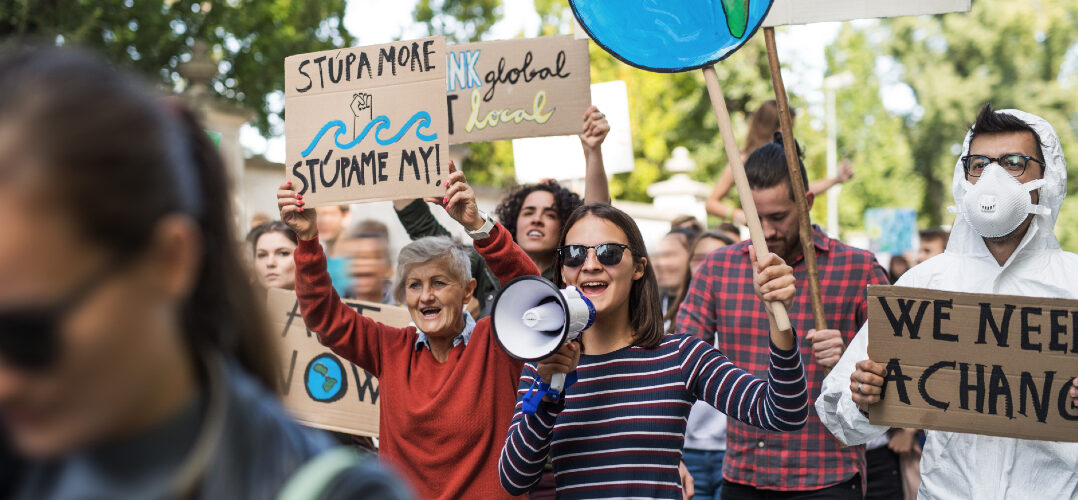Activism is likely to be the second biggest global business risk for 2020, after geopolitics and the US campaign trail, reveals Control Risks’ 2020 RiskMap. This comes at a time when the definition of ‘corporate purpose’ has broadened to encompass employees and the community as stakeholders.
“New wave activism has many channels and manifestations. It’s out there and it’s in your organisation,” says global risk consultancy Control Risks in their article on new wave activism linked to the 2020 RiskMap.
“As real estate professionals, reacting to the challenges faced by business is not enough. We need to be thinking: how do we take a leadership role?”– Sean Tompkins, RICS
At last year’s first MIPIM Sustainability Forum, Sean Tompkins, Global CEO of RICS, talked about the many challenges faced by business, from political uncertainty to cyber security, resource scarcity and climate change.
“As real estate professionals, reacting to the challenges faced by business is not enough,” Tompkins added more recently. “We need to be thinking: how do we take a leadership role in helping to find new, more innovative ways for the built environment to overcome these challenges for the next generations?”

As activism has risen so has the influence of business. Trust in the corporate world lies well above that of governments, according to the most recent Edelman Trust Barometer (above).
“It’s time for leaders in the real estate industry to ensure they are doing everything they can to enhance trust and confidence” – Sean Tompkins
As Tompkins said: “It’s time for leaders in the real estate industry, which is a key sector within the business world and one which accounts for 70% of the world’s wealth, to ensure they are doing everything they can to enhance trust and confidence.”
Corporate purpose debated at MIPIM Sustainability Forum
Joining Tompkins on the responsible business practice panel at the 2019 MIPIM Sustainability Forum were: Régis Meyer, Senior Adviser Climate Action, the French Ministry of Ecological Transition; Chiara Pozzuoli, Project Manager, RWDI; and Joanna Rowelle, Director, Integrated City Planning, Arup (below).

For the real estate industry to take a leadership role, and to build new corporate purpose, the key word at MIPIM was “collaboration”, in particular between developer and investor, private and public, the real estate industry and the local community.
“We need to collaborate… We can no longer work in silos” – Régis Meyer, French Ministry of Ecological Transition
Régis Meyer of the French Ministry of Ecological Transition said: “We need to collaborate. Buildings emit 6% of the world’s CO2, but this rises to nearly 40% if we go upstream and downstream. We can no longer work in silos.”
The activist goals that will form tomorrow’s regulation
“History tells us time and again that the activist goal of today can be the regulation of tomorrow – and the societal norm of the day after,” says Control Risks.
The activist goals that business can no longer ignore are, says the consultancy:
- Global warming & broader environmental issues
- Diversity & inclusion
- Gender equality
- Modern slavery
“Even if you think something is not an issue in your company, you might be wrong and, critically, a client might disagree, and you could lose their business,” the report warns.
“Even if you think something is not an issue in your company, you might be wrong, and, critically, a client might disagree, and you could lose their business” – Control Risks
As Control Risks points out, new wave activism is not just taking place in the streets. Some six out of ten millennials would look to leave an employer within two years if they didn’t see the company having a positive impact on communities, reveals the 2019 Deloitte Millennial Survey.
The future of business is profit for purpose, says RICS Global CEO…
With regards to whether companies are still maximising short-term share prices rather than long-term cash flows – acting for the short rather than the long term – the debate is still ongoing. But, as Tompkins said at MIPIM, the future of business is about « profit for purpose », and not « purpose at the expense of profit ».
Looking around the corporate world, the voices that contend that ‘profit for purpose’ is the way ahead are getting stronger. Sustainable investing, for example, is up, according to the latest Global Sustainable Investment Review. Any dip in Europe is attributed to the purge of ‘greenwashing’ funds rather than an actual fall in sustainable investing.
… as Control Risks warns not to get pulled into “tactical spats”
To keep ahead of the new wave of activism, Control Risks proposes various measures. The key is to remain strategic… and not to get pulled into “tactical spats”, says the consultancy. “Some activist causes will come and go; others are the shape of things to come, and hold as much opportunity as risk if handled deftly.”
“Some activist causes will come and go; others are the shape of things to come, and hold as much opportunity as risk if handled deftly” – Control Risks
Like buildings, through the course of time, the surrounding social, political and, unfortunately, environmental landscape, is constantly shifting. In response, corporate purpose, and strategy, needs to be monitored and tweaked on an ongoing basis – and sometimes knocked down and rebuilt and repurposed, just like a building. Welcome to the 2020s!
Check out the MIPIM 2020 conference programme. And you may like to read a fuller review on sustainable development topics at MIPIM 2019.
Top photo:Getty Images/Halfpoint



